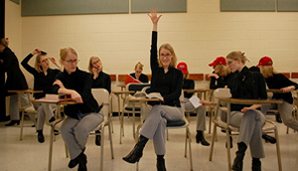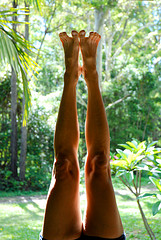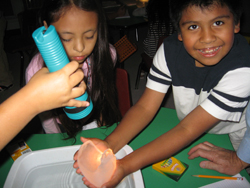 One year ago today, I started kindergarten for the second time. This week I had an experience in a yoga class that brought me back to the way I sometimes felt in my school days, and the way I noticed kids feeling when I returned to the classroom. Given that kids throughout the country are going back to school within the month, I wanted to share my frustration with the situation and how it could have been avoided with an individualized teaching approach.
One year ago today, I started kindergarten for the second time. This week I had an experience in a yoga class that brought me back to the way I sometimes felt in my school days, and the way I noticed kids feeling when I returned to the classroom. Given that kids throughout the country are going back to school within the month, I wanted to share my frustration with the situation and how it could have been avoided with an individualized teaching approach.
Lately, I’ve been struggling with the style of a particular yoga teacher (not my good friend Tara, whom I’ve mentioned before). This teacher pushes me harder than I want to be pushed and doesn’t seem to understand my resistance. Last week we were doing headstands, which I loathe. I was already feeling out of sorts that day, as if I was failing somehow at everything I attempted, so I didn’t want to set myself up for another failure. I made a mild effort to push off from the floor and kick up onto the wall, but it didn’t work and I landed back on my mat. I was fine with that and was ready to call it a day.
 The teacher walked over and gave me what I interpreted as a “You’re just not trying hard enough” look, and she said, “You’re plenty strong enough to do this.” I’m sure she meant it as encouragement, but at that moment it felt like a judgment. She seemed to be making the assumption that as a yoga student, I should want to master every pose, and I should push myself until I did. Everyone else in class could do the headstands just fine, so I felt like the unathletic kid in P.E. class who was being singled out in front of the group. It annoyed me so much that I was thisclose to walking out of class.
The teacher walked over and gave me what I interpreted as a “You’re just not trying hard enough” look, and she said, “You’re plenty strong enough to do this.” I’m sure she meant it as encouragement, but at that moment it felt like a judgment. She seemed to be making the assumption that as a yoga student, I should want to master every pose, and I should push myself until I did. Everyone else in class could do the headstands just fine, so I felt like the unathletic kid in P.E. class who was being singled out in front of the group. It annoyed me so much that I was thisclose to walking out of class.
This week I decided to give the class another chance, but it was just more of the same: a particular pose frustrated me, and the teacher tried to push me beyond my limits. I felt that old rebellious spirit from my childhood rising, as I thought, “I have no interest in doing this, so why should I have to do it? It’s making me dislike yoga.”
While I could have gotten up and left my yoga class if I’d wanted to, young people don’t have that luxury in the classroom. I know classroom teachers who have a similar approach to that of the yoga teacher. I want to be clear that I like them as people, but I think that they and their students would benefit from using five guidelines for individualized teaching. These guidelines would allow students to develop more naturally and enjoy the process.
1. Ultimately, people know what’s best for them and are responsible for their own decisions.
People are born with natural instincts and interests to help them navigate the world. It’s a teacher’s job to help that student develop her instincts, and the skills that help her act on them, so she becomes who she is meant to be. While that may entail occasional pushback and tough love along the way, teachers need to trust their own instincts to know when they should back off and let students make their own decisions. We cannot assume that we know what’s best for other people — no matter how young they are.
 2. Just because you could do something doesn’t necessarily mean that you want to do it or choose to do it.
2. Just because you could do something doesn’t necessarily mean that you want to do it or choose to do it.
If I could have opted out of Chemistry in school, I would have. I did it because I had to, and I was actually not bad at it, but I didn’t enjoy it one bit and have never used it since. I could have invested that time elsewhere — in advanced writing or Literature classes, for example — and decided to study Chemistry later in life if I chose to. I would have gotten a lot more out of it then, because I would have wanted to study it.
3. My passion isn’t necessarily your passion. You might be happy skimming the surface instead of mastering it.
I like to jog but have no desire to run a marathon. It’s not because I’m scared, or doubt I could do it with practice; I just don’t enjoy putting that kind of strain on my body. Some kids would be fine with knowing the math and reading that they need to survive in the world, but aren’t interested in continuing to Calculus or World Literature. In fact, one of my talented science teachers told me that as a student, he never read a single book cover to cover. He never liked literature, and he still doesn’t today, but he’s plenty successful in his field.
 4. If you push people too hard before they’re ready, you risk turning them off of a subject. It’s most important that they enjoy it and find it useful to them.
4. If you push people too hard before they’re ready, you risk turning them off of a subject. It’s most important that they enjoy it and find it useful to them.
I’ve known a lot of people who began to resent reading because they were forced to do it in school, and as a result, they don’t choose to read for pleasure. The same goes for parents who push their kids into dance or piano lessons when they explicitly don’t want to do it. Some may end up liking it and being grateful for being forced, but there are scores of others who will never dance or play piano again. I don’t think the risk of the latter outcome is worth it.
 5. One size never fits all. In any task, provide options so people can succeed at their own levels of skill and interest.
5. One size never fits all. In any task, provide options so people can succeed at their own levels of skill and interest.
Traditional schools are set up as a series of one-size-fits-all benchmarks: kids have to know the alphabet by age X, read by age Y, and write by age Z. If they can’t do it to the “standard” level required, they’re behind, or perhaps they even have a learning disability. In a stimulating, inclusive learning environment, with plenty of expertise available but not mandated, kids will develop different skill sets at their own pace. Any task should have levels of difficulty, so people can choose how much of a challenge to accept. In yoga, for example, the most effective poses have variations that can challenge both the novice and the advanced student.
For those teachers and parents reading this, trust me on these. I know from experience (running youth programs and teaching writing classes) how challenging it is to cater to the needs of the many, but it’s crucial to try. Each student comes into class with different strengths, challenges, and levels of self-esteem, and it’s your job to help that student flourish. That means when little Johnny is slacking off in math and “not living up to his potential,” remember that he might become a world-class skateboarder, innovative video game designer, or renowned journalist one day. And if math happens to be necessary for his chosen career, he’ll find a way to do what he needs to do to get where he needs to go.
 Finally, remember that happiness and well-being are much more important than any achievement or material success. As A.S. Neill said about his famous democratic school, Summerhill in England, “I would rather Summerhill produced a happy street sweeper than a neurotic Prime Minister.”
Finally, remember that happiness and well-being are much more important than any achievement or material success. As A.S. Neill said about his famous democratic school, Summerhill in England, “I would rather Summerhill produced a happy street sweeper than a neurotic Prime Minister.”
I love this post, Melia. You really hit the nail on the head about most of the issues I’ve got–and I’m sure others have–regarding education.
It’s funny you mention not liking chemistry–I am the opposite. I love chemistry and doing experiments but hated the course in school because it was mostly just book work and memorization.
I’m glad it resonated with you. One thing that I was thinking during yoga class is that I had actually signed on to do the activity, whereas young people haven’t even agreed to the school game. It’s just required of them.
I had loved doing science experiments as a kid, but like you, the way it was taught in school turned me off. I also thought of myself as “an English person” and not “a math and science person,” as if they were mutually exclusive.
Oh, what a great post… It sums up nicely what I am trying to bring into my sons’ lives by choosing to homeschool (unschool) them.
It is wonderful that you created the opportunity to learn all this first-hand. Magical.
Stacy, I’m glad to help add fuel to the homeschooling/unschooling fire. The unschooled children I’ve met are, for the most part, more confident and articulate than traditionally schooled kids. They are more advanced in the fields that interest them — e.g. learning programming from a young age — because they have the time, flexibility, and individualized coaching to find answers to their own questions.
I’m passionate about infusing mainstream education with this way of learning, so every child has the opportunities that unschooled kids do.
What a great post! Everything you say resonates with what I do in my Montessori classroom every day, and I see how the children thrive in that type of environment, yet I have parents calling every week asking me when their child is going to start reading or doing math. I wish everyone could read your post. 🙂
Thanks for the comment! I’m excited to read more on your blog about the day-to-day life of a Montessori guide — I love that title instead of “teacher.” I subscribe to the John Holt idea that an adult should be like a travel agent for a child’s education: helping her get where she wants to go, discussing the journey, and suggesting new places to visit.